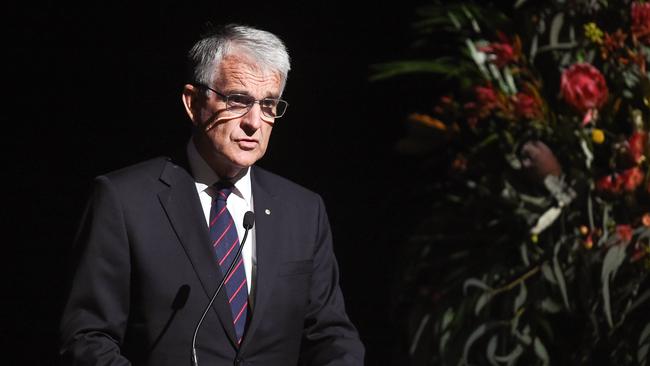PM urged to abandon plan to build subs
A large group of centre-right elder statesmen, senior former defence department figures and leading think-tank experts have made the call.

The Morrison government should abandon plans to build eight nuclear-powered attack submarines in Adelaide and instead accelerate efforts to acquire an Australian nuclear submarine capability by leasing a boat from the US or Britain, followed by an overseas build, according to a large group of centre-right elder statesmen, senior former defence department figures and leading think-tank experts interviewed by The Weekend Australian.
Former deputy prime minister, John Anderson is the most clear cut. He told The Weekend Australian: “We are no longer a manufacturing country. That is tragic but a reality we have allowed to evolve. We are being less than forthright if we think we can build something as complex as nuclear submarines here in an effective and timely way.”
Mr Anderson warmly praised Scott Morrison for choosing nuclear-powered submarines, but said: “We can’t hope to match the brilliance of those who have had decades of designing and building nuclear subs. Just buy the best, our people deserve nothing less.”
Dennis Richardson, a former secretary of the defence department, described the decision to switch to nuclear-powered subs, which he supports, as seminal, but is sceptical of the ability to build them, or all of them, in Australia.
“It’s essential the government does not allow domestic political considerations to compromise what will be a national enterprise. In terms of both cost and schedule, it would make sense for the first one or two boats to be substantially built overseas,” he said.
Former prime minister John Howard, a strong supporter of the AUKUS initiative and of nuclear submarines, told The Weekend Australian: “Operationally, strategically and politically it was a very good decision. The public quite likes the concept of AUKUS. I have no problem with nuclear power for power generation as well as submarines.”
However, Mr Howard said he believed the government should look at leasing submarines from the US or Britain so they arrive as an Australian capability before the near 20 years envisaged in the government’s current thinking.
Another former prime minister, Tony Abbott, while also praising Mr Morrison for switching to nuclear, also strongly supports the leasing option. He told The Weekend Australian: “Speed is of the essence here, even more important than a local build.”
Coalition senator and former major general Jim Molan believes the subs are too far off to have any effect on the strategic challenge posed by China: “What good is it having an eye-pleasing defence industry in 20 years time if we lose the next war? Operational need must trump the industry need.”
Senator Molan further said: “The PM’s prediction on getting the nuclear submarines in one or two decades means we will fight the (hypothetical) China war with the Collins-class submarines.
“The nukes are a worthwhile long-term strategic objective, but they are not the one answer to our national security needs. The next 18 months will be key. Can the PM find more subs sooner?” he said.
Senator Molan also believes at least the first couple of subs should be built overseas.
These reactions, which are widely shared by political, industry, think-tank and other defence figures, highlight the extreme uncertainty of the government’s in-principle decision to go with nuclear-powered subs.
There is a widespread view among defence professionals that it is completely unrealistic to think the ageing Collins subs can continue to be the nation’s front line military capability into the 2040s and potentially the 2050s.
Peter Jennings, the director of the Australian Strategic Policy Institute, suggests abandoning the idea of an Adelaide build altogether, and instead seeking to get work for Australian suppliers integrated into an enlarged US submarine supply line.
He also believes Australia will need another conventional sub to act as a bridge between the Collins boats and the nuclear subs.
As the euphoria which first greeted the AUKUS announcements washes away, profound and troubling questions remain about Australia’s slender military capabilities going forward.




To join the conversation, please log in. Don't have an account? Register
Join the conversation, you are commenting as Logout